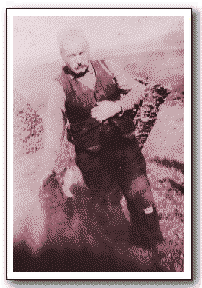Charles McGlinchey
On the 21st December 1861, Niall McGlinchey from Cluainte and his wife, Sile Harkin from Urris gave birth to a baby boy Charles. Charles McGlinchey named after his mother’s father Searlas, followed in his father’s footsteps to became a weaver and tailor.
Brought up in a family of 4 brothers and 2 sisters money was scarce. However, despite his lack of education in a scholarly setting, McGlinchey’s intellect wasn’t numbed in any shape or form. In his younger years no other language was spoken apart from Irish.
However, as he grew older the need for the English language also grew. Never one to take the easy option, Charles taught himself to read English and subsequently learned how to read Irish in the same way.
 He stayed a bachelor all his long life as he never had enough money or property to offer a wife until it was too late. With his mother and father dying in the early 1900’s and his brothers and sisters having either emigrated to America or having died away from their native home, Charles could have lived a very lonely existence. But the warm, energetic way in which he spoke and his insatiable spirit for life reveals a man at ease with himself, a man never wallowing in self pity or begrudging happiness to anyone.
He stayed a bachelor all his long life as he never had enough money or property to offer a wife until it was too late. With his mother and father dying in the early 1900’s and his brothers and sisters having either emigrated to America or having died away from their native home, Charles could have lived a very lonely existence. But the warm, energetic way in which he spoke and his insatiable spirit for life reveals a man at ease with himself, a man never wallowing in self pity or begrudging happiness to anyone.
A talented weaver by trade and a lively story teller by nature, McGlinchey, through his wit and charm has ensured that the past will never be forgotten. A man who having milked his tea directly from 2 goats situated on either side of the hearth is a man of great character. And after all, how many people can claim to have a book written about them and a Summer School named after them? McGlinchey lives on in the hearts and minds of the people of Clonmany as he has given them a gift that no money can buy – the gift of their past.
McGlinchey has become a man of great historical importance. Seldom leaving his native townland, his commitment and interest in his locality served him an opportunity to fulfill his talent for observation.
McGlinchey and local schoolmaster of Gaddyduff National School struck up an intimate relationship which resulted in the book, ‘The Last of the Name’. An insightful account of the contemporary culture of McGlinchey’s generation was the outcome of this collaboration. The history and traditions of our ancestors are in danger of being forgotten but McGlinchey united with the resourcefulness of Patrick Kavanagh and the credulity of Brian Friel have safeguarded our heritage for the time being.


















